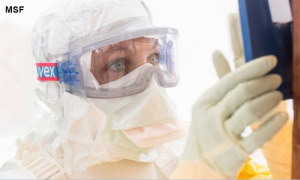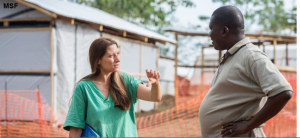 In José Saramago’s book Blindness, he describes an epidemic of an unknown infection that causes people to lose their sight. A single person remains uninfected to bear witness to the anger, chaos, violence, and death generated by the spread of disease.
In José Saramago’s book Blindness, he describes an epidemic of an unknown infection that causes people to lose their sight. A single person remains uninfected to bear witness to the anger, chaos, violence, and death generated by the spread of disease.
In the novel, humanity’s descent into blindness represents the loss of reason and shows how fear can cause dramatic social breakdown. At the same time, the clear vision of one person represents the opportunity to restore light.
What I saw in Sierra Leone, as an epidemiologist working on Ebola, reminded me of Saramago’s book.
I saw “blindness” circulating in villages and among local and international Ebola “experts.” But I also saw wisdom among the patients who survived, and the doctors and nurses who cared for them.
I saw the underestimation of the risk and consequences of Ebola in an area that bordered three countries; the fear caused by rumours; the late communication with villagers about Ebola and its spread; the huge numbers of patients dying in front of us without our being able to provide them with treatment; and the missed opportunity to trace contacts and apply the simple rule of previous outbreaks: “time, place, person.” All of these contributed to a blind response.
As an epidemiologist, I was in charge of setting up the surveillance system in MSF’s Ebola treatment centre in Kailahun, Sierra Leone. This included investigating where, how, and when our patients had become infected; visiting their homes and informing their communities about what had happened; and making sure that all infected people were isolated and that any new cases were rapidly detected.
Villagers told us who had been first to be infected with Ebola. At the beginning, they said, people were helping each other, but later on infected people were hiding in the forest out of fear and to avoid the stigma. For months, villagers were left alone to fight Ebola, and many villages experienced a huge number of uncounted deaths.
Grazia Caleo talking to a local Ministry of Health worker in charge of surveillance.
As a medical doctor, I was also supporting the medical team to treat patients and focus on the most vulnerable. I felt helpless in the face of so many deaths, but also amazed when I was able to assist in patients’ recoveries.
We knew each patient in the line list: their village; their family; how they became infected; and, for most of them, the date of their deaths. We were able to reconstruct their relationships and calculate their risk according to exposure.
Each of them gave us a bit of light, helping us to think about how best to respond and where we should focus our efforts—as well as enabling us to understand the main driver of infection in those places. During my four weeks in the field we admitted 119 patients. With a case fatality rate of 79%, only 17 patients recovered.
The reality is that there is much more that could be done—in terms of data, human relationships, and reason—which, until now, seems to have been affected by the collective blindness generated by this disease.
Grazia Caleo is a medical doctor and epidemiologist based in the Manson Unit of Médecins Sans Frontières (MSF) UK. She has just returned from working on the Ebola outbreak in Kailahun, Sierra Leone.
Competing interests: None to declare.
MSF is looking for qualified epidemiologists and doctors to support the Ebola response. For more information, please see: www.msf.org.uk
